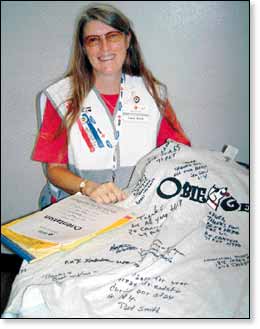When Laura Marsh, a Kaua’i resident and American Red Cross volunteer nurse, offered to help victims of the Sept. 11 terrorist attacks in New York City, she thought she was ready to tackle any challenge. Marsh was a disaster relief
When Laura Marsh, a Kaua’i resident and American Red Cross volunteer nurse, offered to help victims of the Sept. 11 terrorist attacks in New York City, she thought she was ready to tackle any challenge.
Marsh was a disaster relief nurse during Hurricane Iniki in 1992 and other natural disasters in the United States, and she has extensive disaster training.
Yet, when Marsh began her first workday in a relief center three blocks from what had been the World Trade Center, she was witness to a wave of human suffering that taxed her emotionally and physically.
Along with up to 1,000 American Red Cross workers, Marsh saw people with painful injuries, those who were emotionally traumatized and those who railed against the attackers and fretted about the future.
Many lived in condominiums around the World Trade Center. Some sought medical help more than a week after the attacks.
“This was the quintessential disaster,” Marsh said. “I have worked disasters before, but they didn’t prepare me for the magnitude of the grief and pain of the people.”
She said she got control of her emotions and “went to work” at various disaster relief centers until Oct. 4. She returned to Kaua’i the next day.
Marsh, a nurse with the U.S. Department of Veteran Affairs in California and Hawai’i for 25 years before retiring, provided disaster relief services during the 1989 earthquake in the San Francisco bay area and floods in St. Louis, Mo. in 1993 and Hilo last year, in addition to Iniki.
Marsh said her husband didn’t want her to go to New York City because he feared it would be hit by another terrorist attack. But he “knew I had a job to do,” she said.
She flew to New York City and worked with six other American Red Cross workers from Hawai’i, including Lucia Valentin of Kaua’i, who staffed volunteers.
On her first work day on Sept. 22, Marsh said she saw the images of war from the relief center in a condominium complex by the ruins of the trade center: Burned-out firetrucks, smoke, heaps of broken steel and concrete, firefighters on top of rubble.
Most of the streets where she worked were cleared of debris, but nearby parks still were blanketed by dust, a mark of the attacks.
For her safety, she occasionally donned air masks and wore boots.
Working with seven-member teams, she rendered first aid, assessed people’s conditions, provided health and safety education and linked clients with doctors and medical facilities. She also referred traumatized people to mental health specialists with the American Red Cross.
“I saw people who didn’t want to go to the doctors, people who had swollen and painful arm injuries, leg injuries,” she said. “They were coughing and they had colds. Some had asthma attacks.”
One man didn’t want extended treatment because he had to go back to work, despite wrist injuries. In another case, Marsh and another nurse helped a man who got caught in a cloud of debris while evacuating a condominium after the collapse of the two trade center towers. The man had a nagging cough for over a week and only saw a doctor after the nurses recommended it. “When he went to the doctor, he had a heart attack,” Marsh said.
She heard people talk about the “end of the world” and hearing “the crash of the first plane into the tower and seeing the second crash.”
The long work hours also took their toll, she said. Marsh worked 15 hours a day for more than week. At times, she would sleep only six hours and go back to work.
“There would be so many days when I would cry on the shoulders of a fellow worker and they would do the same,” Marsh said.
On other days, rescuers and New Yorkers would pat her and other American Red Cross workers on the back, telling them they had “done a good job,” Marsh related.
Another uplifting moment for her and hundreds of rescue workers came Sept. 23, when people sang “God Bless America” and “New York, New York,” Marsh said.
Staff writer Lester Chang can be reached at 245-3681 (ext. 225) and mailto:lchang@pulitzer.net


